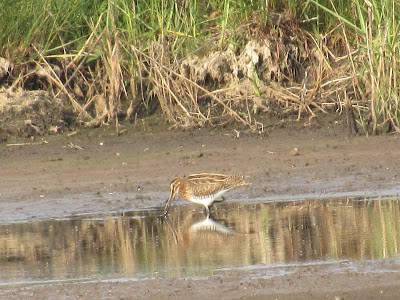 |
| The former golf course near Sutton-on-Sea - photo Lincolnshire County Council |
CONTRACTORS are now on site at a former links golf course earmarked to become a coastal wetland nature reserve.
The National Trust paid £800,000 for the former Sandilands golf course, near Sutton-on-Sea, in Lincolnshire, in April 2020.
It says: "We plan to create new habitat for a variety of wildlife, especially migrating birds such as Black-tailed godwit, Spotted Redshank and Spoonbill along with breeding birds such as Snipe, Lapwing and Oystercatcher.
"We are delighted to have this opportunity as the Lincolnshire coast is one of the most important stretches of English coastline for wildlife, especially as it is on the East Coast Flyway migration route for birds."
 |
| Potential breeder - snipe |
It continues: "We are keen to work closely with the local community to shape the details so we can create a space that everyone can be proud of."
Because of hitches - not least the delay caused by Covid pandemic - it has taken until now to start excavating the lagoons and various scrapes.
But once these are established, is there any reason why Sandilands should not attract the same array of species- and in similar numbers - as the phenomenally successful RSPB reserve some 35 mile away at Frampton Marsh, south of Boston, also in Lincolnshire?
The principal contractor for the Sandilands scheme is The Casey Group which is based in Rochdale, Lancashire.
The main works to be carried out are listed as follows:
• Earthworks to re-model existing site levels to suit the new development
• Drainage installation to service the new wetlands including weirs and culverts
• New footpaths and boardwalk installations to provide safe access around the facility
• New play equipment and bird hide installations
• Soft landscaping including new planting
• New boundary fencing and information signposts
• New car parking areas and overspill grass car park
• Retaining structures and foundations to suit the site level
The Casey Group has given an assurance to keep disruption to nearby residents to the minimum.
It says: "The public highway at nearby Huttoft Bank will be kept in a condition whereby it is mud-free.
"Wheel washing facilities and spray-off areas with sump facilities will be placed within our compound and at the main entrance to prevent mud and or other materials being deposited onto the highway.
"Vehicles can also be washed down upon arrival to site to control cross-contamination.
"Road sweepers will be used throughout the project and service the whole area and surrounding road network.
"Daily highway checks will be carried out by the site management team and photograph records kept."
Meanwhile, measures have already been taken to eradicate New Zealand Pygmyweed - an aggressive invasive non-native species that had been flourishing on the edge of the southernmost pond.
Says a report: "The spoil excavated to create the pond by the previous site owner had been situated on the edge of the pond.
"A local contractor was therefore engaged to bulldoze the material back into the pond, thereby effectively burying the weed.
"Subsequent checks have found no evidence of the plant in nearby ditches and ponds which remain dry for most of the year."
By contrast, the National Trust says it is keen to ensure that Bird’s-foot Clover persists at the site
"Sandilands is the only known location in Lincolnshire of this plant which seems to favour ground newly disturbed by human or livestock footfall."
All being well, the project should be completed by spring next year, though it may take a year or two more for the reserve to be established and discovered by birds and other wildlife.
Part of the funding came from a NT supporter who specifically asked for the money to be spent in Lincolnshire. Substantial further monies came from the Neptune Coastal Campaign.
It is the first coastal acquisition the conservation charity has made in Lincolnshire, and its first coastal purchase since acquiring 1.35km of the White Cliffs of Dover back in 2012.
 |
| Artist's impression of the proposed visitor centre - Jonathan Hendry Architects |
 | |
|
Frampton Marsh have nothing to worry about. This 'nature reserve' is a commercial venture by National Trust, nothing more. The works so far have driven nature out. (Roe deer running along the road - misplaced because of new fencing and short eared owl roost tree destroyed by one swipe of a digger) If the powers that be were really concerned about developing nature they would have put it in the hands of The Wildlife Trusts who have a proven track record. It's a smokescreen to provide a huge seaside carpark that will fill NT coffers, ice cream, burgers and chips.
ReplyDelete